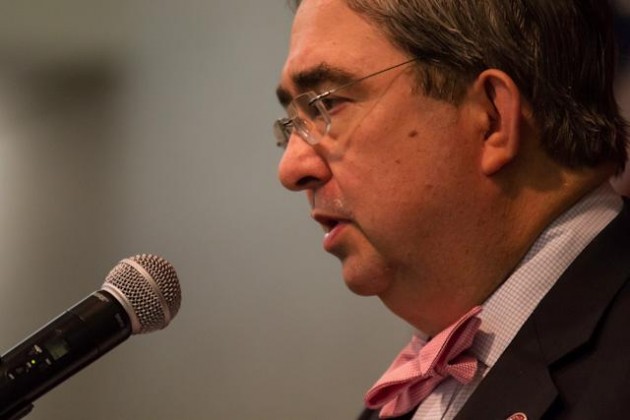
In his biannual State of the College address, President Peter Mercer discussed student affairs, advancements, construction and funding among other important topics.
Mercer also pointed out special achievements within schools at the College. For instance, in the School of Social and Human Services, or SSHS, the proposition for a master’s degree in special education has officially been approved. The Anisfield School of Business recently received a $19,000 endowment for the Career Pathways program, which is designed to prepare seniors for the job market post-graduation with professional development such as specific career counseling, resume building and mock interviews.
“We look to integrate this program to the other four schools of the College in the future,” Mercer said.
Six literature majors within the Salameno School of American and International Studies, including recent graduate Stefanie Mauro, will be presenting at the Sigma Tau Delta Literary Honor Society conference next month in Portland, Ore. Additionally, Ed Shannon, professor and convener of literature, will be publishing an article on the graphic novel. The Office of Enrollment Management will also be offering a program for transfer students with associate’s degrees that fall in line with SSAIS.
Recently, the College also received a $75,000 endowment toward the construction of the Adler Nursing Center in the School of Theoretical and Applied Sciences.
President Mercer commended the efforts of the Student Government Association, which will host a State of the Students address led by Senate President Kevin Cottino during Higher Education Awareness Week, which starts on Feb. 25.
Mercer also mentioned that in alliance with the Office of Residence Life, two Zipcars are now parked and available for student use on campus.
The Office of Enrollment Management reported positive results from this year’s MBA program coming out of the “Pushing Boundaries” marketing campaign launched last year. The office is in the process of selecting 910 incoming students by May 1 for next fall.
The George T. Potter Library now has an American history textbook collection that examines textbooks from the 1820s to the 1980s to allow students to see the changes in the country’s education curriculum.
Mercer said significant progress has been made in the Strategic Planning Task Force and the Master Planning Steering Committee, which both aim to assess potential issues in higher education programs and facilities and subsequently propose resolutions.
“By the end of the academic year, we hope to have a final draft to send to the Board of Trustees,” he said.
This year’s commencement will be on Thursday, May 17 at the Izod Center in East Rutherford. The Office of the President is currently seeking potential speakers.
Mercer also responded to the State of the Union address-which President Obama delivered Tuesday night-in regard to higher education as a “narrow focus on the aspects of education.” Mercer rebutted that narrow analysis.
“We spend too much time on the nuts-and-bolts reasons on the education, not the social value,” Mercer said.
In relation, he expressed his admiration for American philosopher William James’ theory on education.
“For James, a principle aim for democracy is for students to become educated citizens aware of powerful media, corporate practice, popular culture,” Mercer said. “The primary role of university is to educate individual to with the best means to achieve their goal. The purpose of college education is to enable students to lead a life worth living.”
The floor opened for input from attendees. Alex Hoteck, a freshman, commented on student efforts toward building an on-campus music center.
“I introduced myself as a representative of Building the Ramapo Music Center, a student grass-roots organization that promotes the creation of a new music facility,” Hoteck explained after the session.
In response to Hoteck’s probe, Mercer acknowledged his previous discourse with music professor and director of the Ramapo Chorale Lisa Lutter.
“The Berrie Center is not ideal for choral performances, and there are no adequate performance halls for larger performances,” Mercer said.
Hoteck said he was satisfied that the issue was gaining recognition.
“The center had already been conceptualized,” said Hoteck. “[The State of the College] was nice to get a sense of everything that was going on behind the scenes.”






